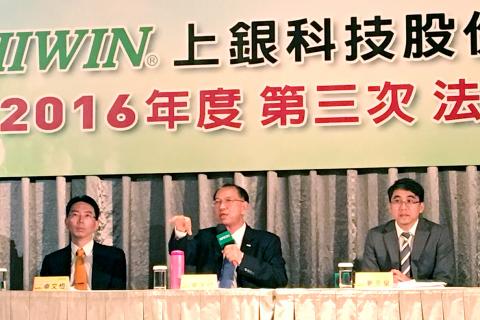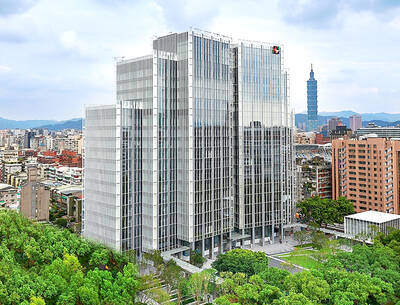Hiwin Technologies Co (上銀科技), the nation’s leading machinery maker, yesterday said it plans to invest between NT$4 billion and NT$5 billion (US$125.2 million and US$156.5 million) next year to expand capacity to meet rising demand.
That represents an increase of between 14 and 43 percent from this year’s NT$3.5 billion.
The money will be spent on building three new plants in Chiayi, Taichung and China’s Suzhou, company chairman Eric Chuo (卓永財) told reporters after an investors’ conference in Taipei.

Photo: CNA
A new factory in Chiayi Dapumei Precision Machinery Park (嘉義大埔美精密機械園區) is to be completed by the end of this year, while another in Taichung City Refined Mechanics Industrial Park (台中精密機械科技園區) is to start operations in the second half of next year.
The first phase of the Suzhou plant’s construction is to be completed in July next year, which would supply products directly to the Chinese market.
In addition, Hiwin plans to move a Hsinchu-based subsidiary’s facilities and equipment to Suzhou, Chuo said.
The subsidiary, Luren Precision Co (陸聯精密), produces gear-cutting tools and spin pumps.
Asked about the sales outlook for next year, Chuo said he is upbeat about the company’s growth momentum, as demand for high-end equipment, such as five-axis machines, is likely to remain robust.
In the third quarter of this year, Hiwin’s net income dropped 18.4 percent to NT$324 million on a quarterly basis, with earnings per share falling from NT$1.45 to NT$1.18, company data showed.
Gross margin during the same period fell to 32.6 percent, compared with the previous quarter’s 34.2 percent.
The company attributed the weaker performance to the New Taiwan dollar’s appreciation against the euro and the yuan, which caused a foreign-exchange loss of NT$150 million last quarter.
In the first three quarters of this year, Hiwin accumulated foreign-exchange losses of NT$273 million, company associate vice president Leo Liao (廖克皇) told investors.
Consolidated sales last quarter fell 3 percent to NT$4.22 billion from the previous quarter, due to reduced orders from European clients during the summer break.
Among Hiwin’s products, linear guideways contributed 62 percent to total revenue in the third quarter, while ballscrews and industrial robots took up 23 and 7 percent respectively.
Hiwin shares dropped 2.72 percent to close at NT$125 in Taipei trading yesterday, underperforming the TAIEX, which fell 0.19 percent.

UNCERTAINTY: Investors remain worried that trade negotiations with Washington could go poorly, given Trump’s inconsistency on tariffs in his second term, experts said The consumer confidence index this month fell for a ninth consecutive month to its lowest level in 13 months, as global trade uncertainties and tariff risks cloud Taiwan’s economic outlook, a survey released yesterday by National Central University found. The biggest decline came from the timing for stock investments, which plunged 11.82 points to 26.82, underscoring bleak investor confidence, it said. “Although the TAIEX reclaimed the 21,000-point mark after the US and China agreed to bury the hatchet for 90 days, investors remain worried that the situation would turn sour later,” said Dachrahn Wu (吳大任), director of the university’s Research Center for

Alchip Technologies Ltd (世芯), an application-specific integrated circuit (ASIC) designer specializing in artificial-intelligence (AI) chips, yesterday said that small-volume production of 3-nanometer (nm) chips for a key customer is on track to start by the end of this year, dismissing speculation about delays in producing advanced chips. As Alchip is transitioning from 7-nanometer and 5-nanometer process technology to 3 nanometers, investors and shareholders have been closely monitoring whether the company is navigating through such transition smoothly. “We are proceeding well in [building] this generation [of chips]. It appears to me that no revision will be required. We have achieved success in designing

PROJECTION: KGI Financial said that based on its foreign exchange exposure, a NT$0.1 increase in the New Taiwan dollar would negatively impact it by about NT$1.7 billion KGI Financial Holding Co (凱基金控) yesterday said its life insurance arm has increased hedging and adopted other moves to curb the impact of the local currency’s appreciation on its profitability. “It is difficult to accurately depict the hedging costs, which might vary from 7 percent to 40 percent in a single day,” KGI Life Insurance Co (凱基人壽) told an investors’ conference in Taipei. KGI Life, which underpinned 66 percent of the group’s total net income last year, has elevated hedging to 55 to 60 percent, while using a basket of currencies to manage currency volatility, the insurer said. As different

Taiwanese insurers are facing difficult questions about the damage of recent swings in the New Taiwan dollar. Regulators might have a partial solution: letting firms change how they calculate the value of foreign currency assets. The Financial Supervisory Commission (FSC) is considering allowing insurers to use six-month average exchange rates when they calculate risk-based capital in their semiannual reports, a shift from the current system where insurers use exchange rates on the final day of reporting. The change could ease pressure on the US$1.2 trillion insurance sector, whose huge exposure to foreign assets came into the spotlight earlier this month after a